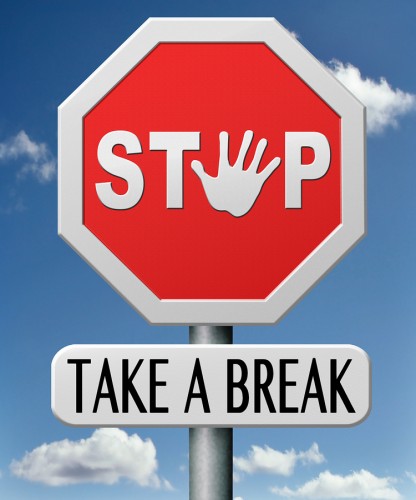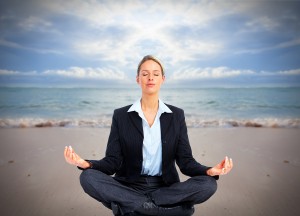Why God rested on the 7th day
 As we begin a new year, many bloggers are writing about goal setting for 2015.
As we begin a new year, many bloggers are writing about goal setting for 2015.
I have done that before and you can read my previous post HERE.
But aside from setting goals and intentions, if we want to bring about something new in our lives, we have to change what we are doing, or how we are doing it.
If you keep doing the same old thing, you will get the same old results.
Today I’m going to propose one change to your life that may make a surprising difference: more rest.
Why God rested on the 7th Day
We’ve all heard the phrase from the Bible, “And God rested on the 7th Day.” But what does it mean, really?
God is all powerful and probably doesn’t need rest Him or Her self – but there’s a message there for us: that we should get enough rest, too.
What encompasses rest?
First, slow down. There are a number of “slow” movements that have started in the past couple of decades: slow food, slow travel, slow living, slow parenting, slow science, slow thinking and more.
All are born out of a cultural shift encouraging us to slow down the hectic pace of modern life.
For example, the slow food movement was created as an antidote to fast food. Slow, mindful preparation and taking time when you sit down to a meal will inevitably lead to better health.
This is what Bear Heart, in The Wind Is My Mother, says about eating: “You need to pay attention to your stomach, what you’re putting into it and how you’re doing it, because your stomach is your biggest help – it’s where the energy that sustains your life enters your body. You think you save a lot of time by working while you eat, but then you don’t understand why you feel tired and have such bad indigestion.”
Other ways to rest:
 Honor your need for sleep: New research indicates that lack of sleep leads to decreased brain function and increased risks of heart disease and obesity.
Honor your need for sleep: New research indicates that lack of sleep leads to decreased brain function and increased risks of heart disease and obesity.
In one study, researchers found that subjects who slept just six hours a night for 14 days had the cognitive function of someone with a .1% blood alcohol level. That’s legally drunk.
There is no magic number as to how much sleep we each need, as the amount can vary according to age and lifestyle. Seven to eight hours seems to be the norm, but we each have to be the judge of what’s right for us.
Balance work and play: Have fun! Every day, every week, and find balance in all you to.
“Some people read heavy books, one after another. It’s really an imbalance. I read plain old westerns, then I’m ready to read something like Carl Jung’s God’s Answer to Job and I can just drink it all in. Then I leave that for awhile and I’ll get back to a lighter topic.” Bear Heart
Time for self: I had a friend who created a highly successful chain of dental practices who attributed his success to taking “time for self” – every three months he would go camping for the weekend. No phone, no media – just total relaxation time in nature.
He considered it one of the keys to his success.
Silence: Sit in silence or meditation now and then. Unplug. Turn off the TV.
“The beauty of silence, the lack of frenzied activity for period of time helps us collect our thoughts and center our lives so we can maintain a sense of calm when we return to the hectic society and resume our work.” Bear Heart
Vacations: Research shows that vacations are one of the best ways to relieve stress and increase productivity and job performance. It can reduce depression, increase family cohesion, foster creative thinking and improve well-being.
According to a recent Reuters/Ipsos poll, only 57% of U.S. workers use up all of the days they’re entitled to, compared with 89% of workers in France.
More than two-dozen industrialized countries mandate at least four weeks or more paid vacation per year, compared to the norm of two weeks in the U.S. In fact, much of the rest of the world calls the U.S. the “no vacation nation.”
Breaks during the day are scientifically proven to boost focus and productivity. The Draugiem Group recently conducted an experiment to track the work/break habits of its most highly effective employees. The magic numbers were working for 52 minutes, followed by a 17-minute break.
Others find that working in 90-minute spurts is found to be most effective and productive; then take a break where you step away from the computer and move your body.
The most effective breaks are those that involve deep breathing, meditation or yoga. So, don’t work longer – work smarter.
Naps: A 25-30 minute nap is an effective energy-booster according to sleep expert Dr. Michael Breus.
 Meditation: Meditation lowers blood pressure, lowers stress, amps up your immune system, decreases pain, improves mood. Need I say more?
Meditation: Meditation lowers blood pressure, lowers stress, amps up your immune system, decreases pain, improves mood. Need I say more?
Spa time – A hot bath, massage and energy healing sessions can help you totally relax. Time at the spa is one of my favorite ways to relax and de-stress.
So pick at least one of the above methods to refresh and renew yourself. And here’s a story to help motivate you.
How do you sharpen your ax?
A long time ago, two zen masters engaged in a wood cutting contest. The one who chopped the most wood in a given time would win.
Every time Master Wu looked over at his competitor, Master Chen, Chen was sitting down.
Wu thought, “I am going to win this contest easily!”
They chopped wood all day, and still, every time Wu looked over at Chen, he was sitting down.
At the end of the day, the two wood piles were measured and, much to Wu’s surprise, Master Chen had chopped more wood!
Master Wu exclaimed, “How is this possible? For every time I looked at you, you were sitting down!”
Master Chen replied, “Ah, but when I was sitting, I was not merely taking a break – I was sharpening my ax.”
So sharpen your ax by incorporating some of the above rest strategies into your life. You’ll be the better for it.
After all, even God rested on the 7th Day.
Molly Larkin is the co-author of the international best-seller “The Wind Is My Mother; The Life and Teachings of a Native American Shaman” and other books on health. She is passionate about helping people live life to their fullest potential through her classes, healing practice and blog at www.MollyLarkin.com

